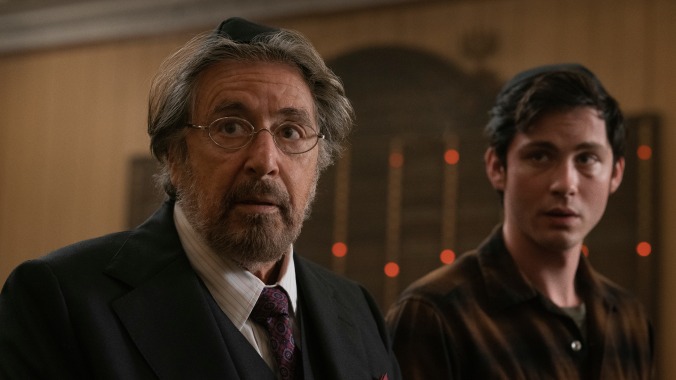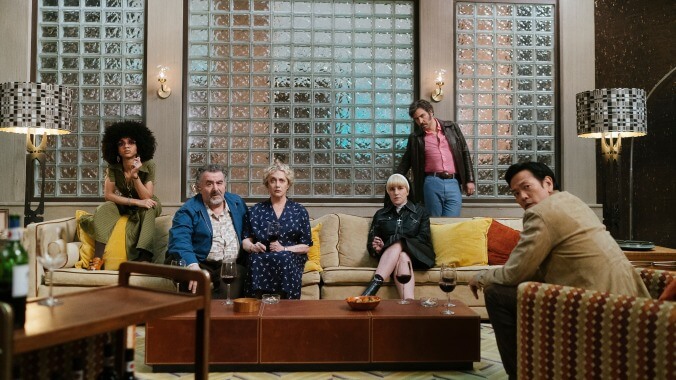Grindhouse movies aren’t exactly known for their character development—or their acting, or their plot. No, the gritty, pulpy style of cinema whose aesthetic calcified in the late ’70s and was fetishized in the late ’90s and early ’00s stands on two pillars, and two pillars only: cool style and a badass idea. It’s the reason the aesthetic works so well in bite-sized trailers and mock-up posters, and it’s the biggest obstacle creator David Weil has to contend with on his Amazon series Hunters. Of course, there have been film directors who have been able to elevate the concept—most notably Quentin Tarantino, to whom this show owes an immense stylistic debt. But spreading a grindhouse style action-exploitation story over 10 hours of prestige TV drama (as opposed to, say, the gonzo horror of Syfy’s short-lived Blood Drive) is a new experiment in storytelling. The results are mixed, but the innovation is appreciated nonetheless.
Hunters ends its first episode with a slam-bang divulgence, as Meyer opens a door in his subterranean office to reveal a rogue’s gallery of B-movie stock characters: Joe Torrance (Louis Ozawa), a veteran who never left Vietnam in his mind; Roxy Jones (Tiffany Boone), a tough-talking soul sister with ties to the Black Panthers; Sister Harriet (Kate Mulvany), a gun-toting British nun of mysterious origin; and Lonny Flash (Josh Radnor), a narcissistic, wisecracking actor who moonlights as an assassin. (Less typically, there’s also a sweet sixtysomething Jewish couple with a knack for codebreaking played by Carol Kane and Saul Rubinek.) Each of these characters is introduced with a trailer-style vignette that briefly blasts viewers back to 2007, backed by surf rock and a run through the scratch-and-grain After Effects plugins that became ubiquitous in the wake of Tarantino and Robert Rodriguez’s Grindhouse.
Thankfully, Weil and the show’s rotating lineup of directors only use this gimmick once (at least, in the five episodes screened for critics). But its spirit remains strong throughout. If there’s an opportunity for stylistic excess, Hunters will take it, whether it’s through the ironic fake TV segments that pepper early episodes or the loud patterns that cover every available wall and piece of furniture. Similarly, you’ll never have a chance to forget that the show is set in the ’70s; the same issue of TV Guide with Farrah Fawcett on the cover is shown four times in the first episode, and The $6,000,000 Man comes up twice. (Come in halfway through? No problem; the breakdancers on the graffiti-coated subway car should tip you off.) The Tarantino tributes are similarly obvious, a pastiche of a pastiche that manifests in Reservoir Dogs-style torture scenes and dizzying copycats of the director’s signature 360-degree tracking shots.
The series’ sense of Jewish identity is also heavy-handed, with frequent name-drops for everything from shofars to chicken noodle soup. As a gentile, it’s not really for this writer to say whether these references are in good taste. But you don’t have to be Jewish to know that Lonny telling Jonah that a woman “mazeled my tov” and “gefilted my fish” is a hacky joke. As a work of Jewsploitation, Hunters falls somewhere between 2003’s The Hebrew Hammer and 2009’s Inglourious Basterds; it’s goofier than Tarantino’s film, but equally, righteously electrifying in its dedication to ultraviolent comic book revenge. The problem with Hunters is, it’s stretched out a lot longer. And the deeper the show gets into thorny moral conflicts and sustained character development, the more trouble it has reconciling its pulpy sensibilities with its sobering themes.
Pacino provides a balanced through-line as even-tempered radical Meyer, adopting a more European variation on the gait and accent he used to play movie producer Marvin Schwarz in Once Upon A Time… In Hollywood. But only he and Lerman—whose Jonah spends more time skulking around debating whether he really wants to kill Nazis than is dramatically advisable—have any real opportunities to act. The rest of the cast is playing a loose collection of thinly drawn archetypes (perhaps even stereotypes), which works better for some characters than others. It’s true that we don’t need backstory to fear Travis Leich (Greg Austin), the Nazi assassin who stalks the edges of the story like an Aryan Anton Chigurh. But did Hunters have to name the overweight sidekick for whom we’re supposed to feel deep pathos Bootyhole?
There’s something to Hunters’ portrayal of Nazis as the ultimate WASPs, and underneath all of its flashy camerawork and kitschy-cool needle drops the show is picking at a scab white Christian America doesn’t want opened. Although we like to paint Nazis as inhuman supervillains—something that this show also does, to be clear—in real life, we let bigots and fascists walk among us unquestioned and unmolested. Hunters finally hits its thematic stride in its fifth episode, in a scene where Jonah, Joe, and Sister Harriet scan the crowd at a Fourth of July party full of Nazi war criminals as a woman in an American flag dress sings “America The Beautiful” in front of a Confederate banner. There’s nothing subtle about it, but its message is powerful: The KKK, the Nazis, the CIA, the senators they keep in line with blackmail and corruption—they’re all the same. And they all deserve what’s coming to them, if only in the court of pop culture revisionism.



 Keep scrolling for more great stories from The A.V. Club.
Keep scrolling for more great stories from The A.V. Club.